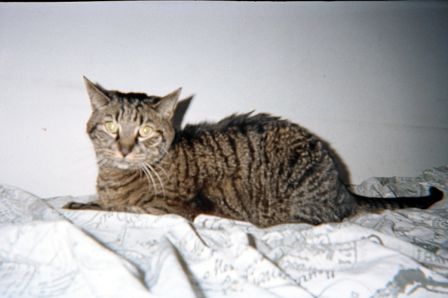The Ashkenazis owned the apartments and fomented the plans, while the Sephardis did the dirty work, as they always had, they said--these swarthy, stocky, beautiful men whose families arrived in Israel from Egypt and Morocco or merely stayed put in what they had known as Palestine. Up until the late '60s, the Sephardis were called blacks--after the American situation--and were kept down.
Which somehow led to cats--what was wrong with them. Cats, as opposed to dogs (read Israeli women?), would never do anything for you: no fetching of slippers, no ingratiating wagging of tail. The arrogant bastards lived entirely for themselves.
I am not a "cat person," as people like to put it, any more than I'm a "people person," so I knew what the man meant. I have witnessed many a cat get what she wants while remaining largely impervious to the person giving it.
But not Noodles, not Lump-Lumps--not Alfredo Fettuccine Scherr, who died on July 17 after a run of sixteen years.
WHENEVER WE WENT TO THE VET, I'd exclaim, "Isn't he beautiful!?" and the doctor would say yes--what choice did she have? But she also said, unprompted, "What a good cat. What a sweet cat."

Alfredo was impressionable. He was responsive. He ventured into territory he would never entirely understand simply because it was where I was.
For example, there was the dance. It began 12 years ago, with him meeting me at the front door and racing through our railroad apartment to the bedroom in the back, where he executed quasi-Aikido rolls that finished with his bunny feet flopping up into the air as he landed heavily on his side. He did this one move until he calmed down enough to let me rub his belly. Within a month I could summon the belly-rub desire with, "Do the Dance, Alfredo. Do the Dance." In the weeks before he died, when he hardly had a belly to rub or much to feel pleasure about, he was still falling to his side to await my giant hand.
IN THE LAST MONTHS on the way to the bathroom, he fell into flamenco deep song, where the keening descending chords expire in an exhalation of despair. If he was silent, I'd start us off--and Alfredo, king of suffering, would sing louder and longer to drown me out.
My life revolved around twenty-seven droppers a day, five to seven at a shot, timed as well as my work would allow to keep his nausea at bay. I had a job away from home now that often held me late; on the subway back to Queens, I scrawled my schedule on the backs of envelopes:
feed alfredo
pet alfredo
do stretches
feed alfredo
dinner
feed alfredo
bed
It is possible that a person trapped in such close quarters with me for sixteen years would also eventually have shown he felt my love, that I mattered, that I had touched him: proof that I am not alone. But it probably wouldn't have been so clear. Person-to-person love can seem awfully like self-duplication or self-betrayal--and vice versa. With Alfredo, there was no danger of getting mired in a hall of mirrors: however many of my habits he took on, I would never mistake him for me. It's a wonderful paradox that, in being so alien, an animal allows you the same unself-consciousness he glories in. You can tell you've touched him, but you don't worry about the you or the him. And he lets you find yourself in him without you even knowing it's you.
Alfredo changed me--the ideas I live by. More and more, I imagined the luxurious fruitlessness of lying all day on bed or carpet, in soft holes in backyards, on piles of dirty clothes in closets that reeked of cat at his mustiest, with nothing much to think about or worry over. My wretched food would be provided for, and the special lady's enormous face would rub against my whiskers. Shaded in melancholy, Alfredo proved the perfect source for daydream: I wouldn't have to relinquish my muddy mix of feeling to be in his place.
But he couldn't have said how he felt, like I can. It's an old question, what humans gain from our keen consciousness. And for me it's had a particular New York cast to it for the last ten years. I moved across the country, to a room with a view of pigeon-shitted brick, because I didn't want to be an office assistant for scheming Israelis forever. I wanted work that mattered.
Now that I'm older and more defeated (that's a New York state of mind, too), I'm not sure any work could matter as much as a big, soft hole.
The month Alfredo died, I added another absurd job to the roster. The week at the office ends with the usual ritual questions about what you're doing this weekend. People understand that those two leftover days may say more about you than anything over the last five. When, a few Fridays ago, a colleague asked me, I said, "I'm going to lie around with my kitty."







No comments:
Post a Comment